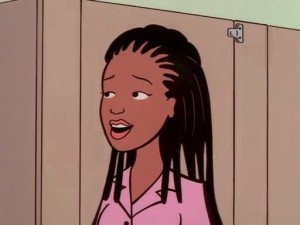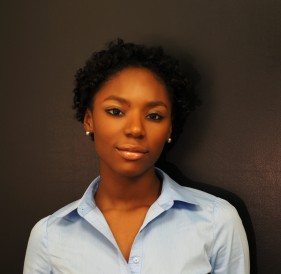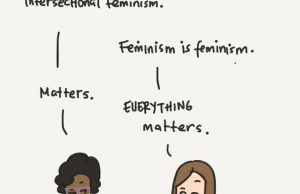COLLEGE FEMINISMS: Some Thoughts From a Stuck-Up Jezebel
By Monique John
Stereotypes are not new to me. I’m black and female—two identities that are the most oppressed of all, even in our ‘post-racial society’ where a tan-colored woman wearing box-braids is hosting her own political talk show on national television and cocoa-toned girls are being raised in the White House. Since entering the great ivory tower nearly four years ago, I sometimes used success as a shield – becoming a noteworthy student for my participation in university publications and student organizations. But, despite my accomplishments, I still felt stifled by people around me, silenced by the stereotypes that haunt me as a black woman.
Patricia Hill Collins is known for conceptualizing “controlling images,” her brilliant breakdown of the varying stereotypes used to oppress black women. Collins focuses on how stereotypes are used to exert control over others. However, given the of micro-aggressions I’ve personally been subject to, I’m more interested in the way stereotypes affect how we see and label others, in academia and in social settings. An old mean text message illustrates my point:
“IT’S JUST AS WELL THAT IT’S OVER. I WAS GETTING TIRED OF YOUR UPPITY ASS ANYWAY.”
The words flashed on the screen of my Droid as I grabbed it to check the time. The words didn’t surprise me. But they stung.
They were the words of my ex-boyfriend, Sharpie. He was black, broke, and in-and-out of community college. His boyishness could be charming, but it could also be cruel. We were growing apart: I was making work contacts, building my portfolio, hopping from internship to internship. He was building another relationship outside our own—one with his mother’s couch and its cousin, a Play Station IV. I became bored and decided to leave. And boy, was there backlash.
There were many nasty things Sharpie had to say to me at this point, flooding my Hotmail account, Facebook and Twitter inboxes. But the most consistent, harshest complaint was that I had always been too uppity. Too inquisitive. Too…unfamiliar. He was willing to overlook these qualities in the beginning though: apparently a woman with an ass like mine, no matter how uppity, was simply too fine to resist.
Perhaps I can be overly inquisitive at times. After all, I am a journalist. You can find a story in virtually any topic or phenomenon; it’s just a matter of asking the right questions.
My intellect and early achievements mislabeled me as being too out of touch with the lay (black) man. My jeans weren’t skinny enough. My inflection was too high and perky. I used words that were too stiff, too big. (Who’s ever heard a black woman use the word ‘gelatinous’? Apparently, not Sharpie.) My desire for education, high-skilled labor, modest wardrobe and ‘white-girl’ lexicon were things I was supposed to be ashamed of. I was a black woman that refused to identify with my kind, valuable for her beauty and sexual capital, but evil for breaking away from the tropes and stereotypes of what a black woman is supposed to be.
I call this phenomenon “sexual otherism,” labeling a black woman with noteworthy intellect and professional achievements as abnormal and pretentious, simultaneously reducing her human worth to being a sexual commodity.
I’ve experienced this with many other people in many other settings. For almost my entire high school career, I was an honor roll student. Despite this, my Irish, 60-something headmaster amused himself by calling me names like “Black Beauty” and “Black Magic Woman.”
At a bar with my Korean girlfriend, she greets me snapping her fingers, squealing “Hey sistagirl!” She insists on patting my afro.
At a house party with fellow Fordham students in an Upper East Side apartment, I strike up a conversation with my square-faced, chestnut haired colleague at the school newspaper about doing an investigative story on school administrators. He nods, dipping his eyes to my breasts between sips of his sangria, as I talk.
In each of my experiences, the person that I was interacting with threw my positive, wholesome qualities out the window. Instead of seeing me, another black woman had taken my place. She could have been a mammy, a matriarch, a sapphire or a welfare queen standing there. But because of my attractive, youthful appearance people chose to simply view me as a Jezebel. My actual personality strayed too far from their expectations of me as a black woman, so rather than fully embracing it, they “otherized” it, switching it with an image that was easier for them to digest.
My stories remind me of the black woman that is the ultimate icon for sexual commodification. Standing in a cage surrounded by oogling Europeans, the Venus Hottentot thought to herself: “I speak English. I speak Dutch. I speak a little French as well, and languages Monsieur Cuvier will never know have names.” (from Elizabeth Alexander’s poem, The Venus Hottentot (1825)) Sarah Baartman is famous for being put on display, marveled at for her curvaceousness and genitalia. Clearly, her educational background was never featured in her traveling exhibition.
Everyone has had some sort of experience with stereotypes, whether their identity was being imposed upon by a stereotype or they were projecting a stereotype unto someone else. The old adage “you can’t judge a book by the cover” is sweet, but it is unrealistic in terms of the way we interact with one another. We categorize others based on our personal understandings of them—that is simply how we function as humans. But if my experiences have taught me anything it is that we can at least take greater pains to fully understand each other beyond our rigid, sweeping social divisions. If we listen closely to ourselves, we’ll see how our words reveal the hurtful assumptions we make of others.
_____________________________________
Monique John is a recent graduate at Fordham University. John has a love for non-profit work and currently serves as an Ella Baker Trainer for the Children’s Defense Fund. She is also writing her thesis on strip club imagery in hip hop entitled “Poles, Power and the Everyday Woman.” Having worked as an editor for the Fordham Observer, John blogs about black sexual politics, education, women’s issues, the black community and media representation at moniquejohn.com.






48 Comments